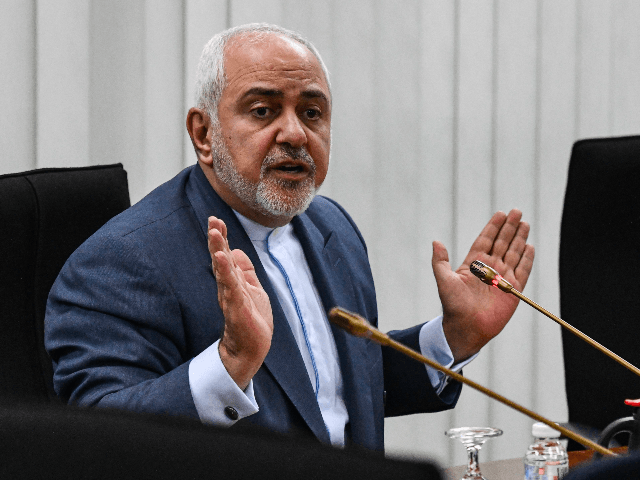Iranian Foreign Minister Mohammad Javad Zarif using a derogatory term for Jews in an interview with an Iranian journalist last week, in addition to sarcastically wishing the United States would “leave planet Earth.”
Zarif later admitted using the anti-Semitic language but insisted his comments were misinterpreted.
Zarif gave a video interview to Iranian journalist Mehdi Nasiri on December 9 that was translated into English by the Middle East Media Research Institute (MEMRI), an organization that specializes in such translations, particularly when Middle Eastern leaders are found speaking very differently to local audiences than to the outside world.
Part of the interview concerned Zarif insisting incoming U.S. President Joe Biden must abandon all sanctions against Iran and rejoin the nuclear deal, formally known as the Joint Comprehensive Plan of Action (JCPOA), without conditions.
“America is still obligated to lift its sanctions, and to refrain from creating obstacles, because it has remained a member of the U.N. since leaving the JCPOA. Of course, it had the option to [leave the U.N.], like it left UNESCO and other organizations. Allah willing, it will also leave Planet Earth,” Zarif said, as interpreted by MEMRI.
After complaining at length about the Trump administration’s treatment of Iran, Zarif suggested the United States owes Iran some sort of reparations because it sold weapons to Tehran’s adversaries, Saudi Arabia and the United Arab Emirates, at the same time it was ratcheting up sanctions against Iran.
Asked about Iran’s position toward Israel at a time when other Muslim nations are making peace and officially recognizing Israel as a legitimate state, Zarif “unequivocally” stated, “I cannot think of any circumstances under which we would officially recognize Israel.”
“I am not saying that it’s impossible, but I cannot imagine under what circumstances we would do this,” he said, which is a bit more equivocal than unequivocal statements usually are.
Zarif proceeded to dismiss the idea that Iran might attack Israel, claiming he and Iranian Supreme Leader Ayatollah Ali Khamenei have diplomatic solutions in mind for their quibbles with the Jewish state, rather than genocide.
Zarif referred to the Jews by the offensive derogatory term “kikes,” which is rendered in Farsi as “jahood,” according to MEMRI:
This is a different stance held by the Islamic Republic, and I think there is no problem for it to have its own stance. That’s one point. Second, what is our solution? The honorable Leader [Khamenei] has expressed the solution. We’re not talking about throwing the kikes into the sea, or about a military attack, or about suicide operations. The Leader has said what the solution is, and it has been presented to the United Nations. Our solution is a popular referendum, as you mentioned.
Zarif responded on Thursday by claiming MEMRI “has sunk to a new low in taking my pejorative usage of a word to accuse me of anti-Semitism.”
“I was mocking the allegation that Iran seeks to ‘throw the Jews into the sea’ and reiterating our solution is a referendum with the participation of ALL: Jews, Muslims, Christians,” Zarif insisted.
MEMRI responded to Zarif’s response by accusing the Iranian Foreign Minister of dishonestly attacking their organization and “lying about Iran’s position on Jews and Israel.”
“The MEMRI archives are full of research proving that the Iranian regime and its leaders are anti-Semitic and call openly for the annihilation of Israel,” the statement added, linking to dozens of such comments by Iranian officials, spokespeople, and media.
The Saudi Al-Arabiya news service quoted Iranian-born Jewish commentator Meir Javedanfar dismissing Zarif’s excuse by noting there are other words in the Persian language he could easily have used instead, calling “shame” on Zarif for choosing “jahood.”
“I can unequivocally say that his use of the word in this context was anti-Semitic,” Javedanfar declared.
Iranian author Roya Hakakian highlighted the contrast between how Zarif speaks to Western audiences and what he says to Iranian media.
“When Zarif speaks to Western press, everyone sees a polished and reasonable man. In Persian, his brutal self won’t be subdued. Here he says, good-humoredly too, that he hopes the U.S. will disappear from the earth,” Hakakian said.
“Reformist?” Hakakian snorted. “Only another hardliner without a turban.”
Zarif spends a good deal of his time insisting Iran is not anti-Semitic, but merely opposes the Israeli government and “Zionists.”
In February 2019, when U.S. Vice President Mike Pence accused Iran of spreading “vile anti-Semitic hatreds and threats of violence” while plotting “another Holocaust,” Zarif responded by calling Pence’s comments “laughable.”
“Iran has always supported the Jews. We are just against the Zionists. The Holocaust was a disaster,” Zarif said, the latter an effort to paper over the considerable amount of time and money Iran invests in Holocaust-denial projects.

COMMENTS
Please let us know if you're having issues with commenting.